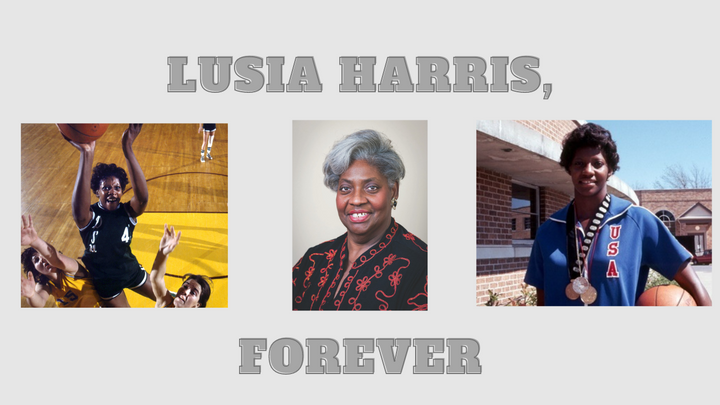What I learned at the Tuskegee Archives + thoughts
Here's what I learned during my April archive trip and a couple thoughts the documents sparked.

Good morning!
Thank you for your support of The Black Sportswoman. Truthfully, I am extremely overwhelmed and behind, but so grateful for the 70 of you that pay to support our work. It is genuinely both exciting and grounding – and we are growing!
This week for our paid members only post, I wanted to share some little known (to me) facts I learned at the Tuskegee Archives during my visit in April. They aren’t Tuskegee-only facts, it seems most things have a national twist, or national implications.
For example, Tuskegee Athletic Director Cleve Abbott was VP and President of the American Tennis Association at one point, nationals were held there (I saw a program featuring Ora Washington, like it wasn’t a big deal!). In general, Tuskegee is/was so interconnected with the national landscape of women’s sports.
So, who has the info in the archives? I really only got a glimpse, but R.C. Owen wrote “A History of Sports at Tuskegee University” and has a large collection at the Tuskegee Archives. Owen was a professor of physical education at Tuskegee, who Cleve Abbott coached and considered a friend.
Owen's collection has the book, a ton of newspaper clips, so many documents, important dates, events, names, meet/game recaps, programs etc. Only a few pages of the book are available online.
So, what I learned at Tuskegee:
- Confirmation of who started the track & field program at Tennessee State, from the person who started the program.
I got confirmation that Jesse Ellen Abbott – in her own words – was the person who started the women’s track and field program at Tennessee State. I mentioned it in our Tuskegee story from last year, but this was the first source I've found with Jessie Ellen speaking.
“I ran for Tuskegee six years, track, played basketball for Tuskegee six years,” she said in a 1974 oral history.* “Then I started the first girls’ track team at Tennessee State, so I’m a legend at Tennessee State.”
Jessie Ellen was the daughter of Cleve Abbott and Jessie S. Abbott. I still don’t know Jessie Ellen’s birth or death date, unfortunately, but I’m going to work on that.
But there is significance to her starting the Tennessee State program after growing up at Tuskegee. The Tigerbelles are probably one of the most well known track & field programs, ever? Not just nationally, but also internationally. It produced, through the training of Ed Temple, plenty of legends, so many Olympians and of course, Wilma Rudolph and Wyomia Tyus, who both were able to display their talents early on at the Tuskegee Relays.
2. A glimpse at what traveling, at least in the U.S., was like for the successful Tuskegee women’s track & field team.
Jessie S., Jessie Ellen’s mother, worked for Jennie B. Moton and Dr. George Washington Carver at Tuskegee, but she was deeply involved with the development and success of the athletic program.
Jessie S. traveled with the team, and drove the bus/vans. (She said the football team had be able to ride in trains with dining cars, though).
Here’s an excerpt from the interview:
Jessie S. Abbott: We would try to find the places for the girls to stop and get food and get a nice rest but it was hard unless we found some of the schools along the way.
Jessie Ellen Abbott: Yea, we had to find another Negro school along the way. There was nowhere for us to stay and in most instances we didn’t want to say in the Negro Hotels because really they were just badly run down. It was really a problem and every year Daddy would have a little fundraising program to get people to contribute to the girls’ track team to send us to these various meets’ AAU meets every summer and that’s how we got our money to travel. Tuskegee Institute was so poor they couldn’t finance us in those days.
Interviewer (Michael Leroy Williams): You’ve had such a rich history of being involved in a lot of activities, particularly sports. What would you say should be the challenge for the future Tuskegee or present Tuskegee in looking at the history, the accomplishments in sports and so forth in making it a better Tuskegee?
Jessie S.: Well I think there will always be a need for Negro schools like Tuskegee and of course, every student can go to a university. Of course, the big white universities now are getting the cream of the Negro crop who used to go to the Colored schools. There will still be enough to carry on the tradition to keep the school alive. So many of our best athletes are given those wonderful scholarships of which otherwise they couldn’t afford to go to those big schools and keep up those expenses.
“I don’t think the history of Tuskegee will every die.”
*The oral history I read was an interview between Mrs. C. L. Abbott and Jessie Ellen Abbott, conducted by Michael Leroy Williams, for the Alabama Center for Higher Education Statewide Oral History Project on June 10, 1974. I can't find it online, but if you want to listen to more from Jessie S., her work with the school and team, here's an oral history (there's both audio and transcripts and her interview is the first on the page).
3. Basketball at Tuskegee, across the country
The first women’s basketball game for Tuskegee women was played on January 18, 1908 and the first coach was Amelia Cromwell.
“From 1923 to 1959 were great years for women’s basketball in Black Institutions. In the late fifties and sixties, basketball for women in many institutions was dropped.” - R. C. Owen, in “A History of Sports at Tuskegee University.”
You could go to the Olympics, through college, with track & field, from the forties through the sixties, and of course after that. But for basketball, Title IX passed in 1972, women’s basketball at the Olympics started in 1976. I find the timeline – and resurgence of basketball across the country – interesting. I don’t have a fully formed thought on this – but I’d like my big July story to be about basketball (I’m working on tennis right now)
Random thoughts:
- I think I love that school had things like “Women’s Sports Days” and "Women’s Sports Carnivals" (I'm 90% sure it's the same thing, just named differently)
- Apparently I didn’t take a picture of it, but there apparently used to be a Muhammad Ali All-American Team for Women’s Basketball and a Tuskegee athlete made it. I couldn’t find anything online but I’m like, why was this a thing? LOL. I’m so curious about it
- So much administrative work went into everything. Edmund L. Burke was the tournament chair for the 1937 American Tennis Association national tournament, and we could see all the minutes from their meetings. But who did all of this work for Tuskegee, who did all this work for the school? There were waivers for parents/guardians to sign for the athletes to compete in the AAU nationals (which is the equivalent of the NCAA championship meet now) and Olympic Trials as a representative of the "Tuskegee Institute Athletic Club"
- What happens to people that aren’t the “first” or who don’t become the greatest of all time, therefore they can’t be ignored? Because, there are so many circumstances that lead to someone becoming the first – and someone else missing out. We don’t know for sure, but for Olympics example: Racism within the team impacted the careers of Louise Stokes & Tidye Pickett, the cancellation of the Games (due to World War II), impacted Lula Hymes and others.
- The above point is just a sort of rambling, but I notice how there seems to be room for one Black woman athlete at a time, when there are so many that do great things, yes, but are significant to the puzzle that is the history of women’s sports in the U.S. but also throughout the world.
I hope this was interesting, email bria@theblacksportswoman if you want to chat about this or have any questions/thoughts!
I’ll be in your inbox on Thursday.



Comments ()